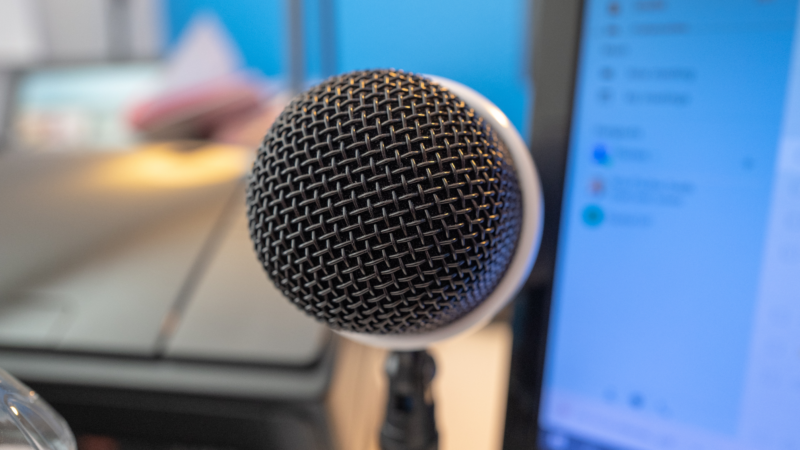Speaking into a microphone? Your audio quality can impact the way people view you
People who participate in online meetings using platforms like Zoom may want to pay closer attention to how their computer microphone alters the sound of their voice.
That’s because high-quality audio can make the speaker seem more attractive and convincing to others, according to results published in the Proceedings of the National Academy of Sciences.
Lower-quality audio, in contrast, can make people seem less appealing.
Brian Scholl, a cognitive scientist at Yale University, notes that video meeting platforms often show participants how their computer’s camera makes them look, so people do things like hide their piles of laundry, brush their hair, or blur their video background.
“I know exactly how I look to you because I can see it myself, but I actually don’t have any idea how I sound to you,” Scholl points out.
He became aware of the potential impact of this during the pandemic, when faculty meetings in his department suddenly went virtual. During one such meeting, when a contentious issue was being discussed, two different colleagues spoke up.
“One of them was an especially close collaborator. We almost always see eye-to-eye. He happened to be participating on Zoom, using the microphone of an older, not-so-hot laptop, and his voice had that sort of tinny quality,” Scholl recalls. “I just sort of noticed that his comments didn’t seem quite so compelling as I thought they usually did.”
Another colleague, meanwhile, had connected to the meeting from his home recording studio, which had fancy audio equipment. Scholl says he respects this coworker, but they usually have different views. This time, though, “I kept thinking, ‘Wow, yeah, he seems right about that,'” says Scholl. “His contributions just seemed somehow more profound.”
That experience made him want to study the effect of microphone quality on people’s perceptions. He teamed up with two members of his lab, Robert Walter and Joan Ongchoco, to design an experiment.
The team made high-quality recordings of people speaking in various scenarios, like submitting an insurance claim or interviewing for a job. Then they took those same recordings and modified them, so that they had a low-quality version of the same recording that made the speaker’s voice sound tinny.
An online research platform allowed the scientists to play these recordings to hundreds of people. “We had each person listen to just a single recording, but we varied which recordings were used across different people,” Scholl explains.
After hearing the audio, the listener had to answer questions about what they thought of the speaker. And it turns out, lower-quality recordings made people deem the speaker less attractive, less intelligent, and less convincing.
“There was a pretty surprising, pretty substantial difference,” says Scholl. “In the case of hiring, for example, people said they were much more likely to want to hire the person when they heard the recording with a very clear microphone.”
The findings held true even when the voices were clearly computer generated. It also didn’t seem to matter if the voice sounded male or female or had an accent.
Scholl suggests that it might be worthwhile to ask a colleague to record how you sound when speaking through your virtual-meeting set-up, “because the answer might surprise you and you can’t hear it yourself.”
He notes that for much of human evolution, people could use the sound of someone’s voice to make inferences about the speaker’s physical features, such as their size and strength.
“That may be one of the reasons we get used to drawing these sorts of inferences,” he says. “We just live in a weird moment, evolutionarily speaking, right now, where the sounds of our voices to other people are not controlled just by our vocal anatomy, but by all these intervening layers of technology that our minds never evolved to deal with.”
Alabama Power seeks to delay rate hike for new gas plant amid outcry
The state’s largest utility has proposed delaying the rate increase from its purchase of a $622 million natural gas plant until 2028.
Former U.S. Sen. Doug Jones announces run for Alabama governor
Jones announced his campaign Monday afternoon, hours after filing campaign paperwork with the Secretary of State's Office. His gubernatorial bid could set up a rematch with U.S. Sen. Tommy Tuberville, the Republican who defeated Jones in 2020 and is now running for governor.
Scorching Saturdays: The rising heat threat inside football stadiums
Excessive heat and more frequent medical incidents in Southern college football stadiums could be a warning sign for universities across the country.
The Gulf States Newsroom is hiring an Audio Editor
The Gulf States Newsroom is hiring an Audio Editor to join our award-winning team covering important regional stories across Mississippi, Alabama and Louisiana.
Judge orders new Alabama Senate map after ruling found racial gerrymandering
U.S. District Judge Anna Manasco, appointed by President Donald Trump during his first term, issued the ruling Monday putting a new court-selected map in place for the 2026 and 2030 elections.
Construction on Meta’s largest data center brings 600% crash spike, chaos to rural Louisiana
An investigation from the Gulf States Newsroom found that trucks contracted to work at the Meta facility are causing delays and dangerous roads in Holly Ridge.









